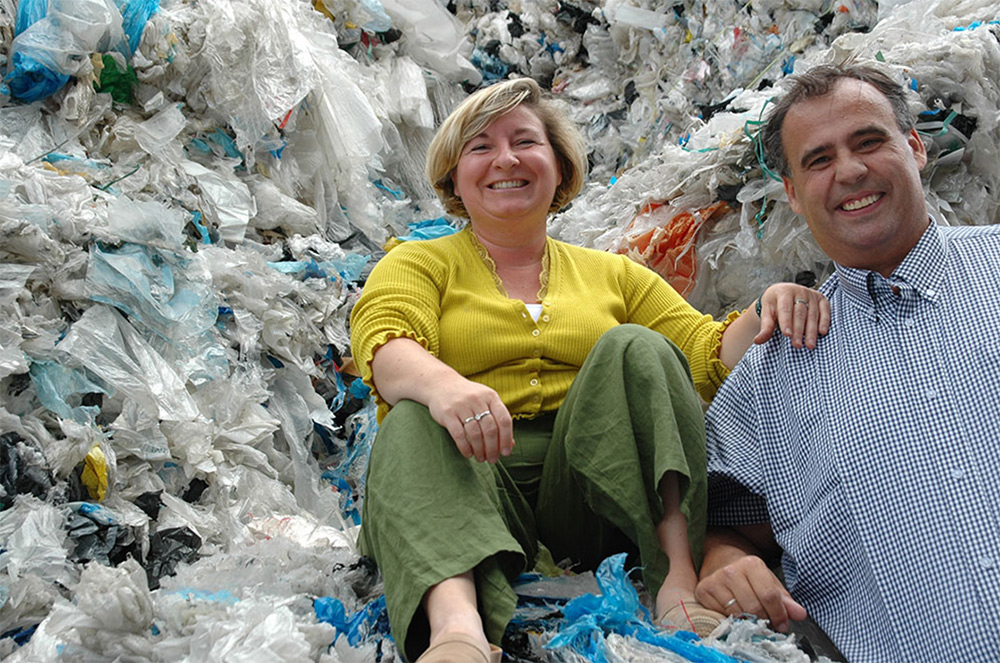Daly Plastics in Zutphen is in plastic recycling and has always done foil. “That is to say, we did grind plastics in the beginning, but at a certain point we specialized. We want to play large volumes and then take things seriously, with a little here and a little there you will no longer be able to do it. That is also why we now set up a large factory in Swifterband that can run one material all day. We have our Caroda factory in Zutphen that does 35,000 tons of LDPE, but within five years there will be factories of one hundred thousand tons. It is also our aim to get there. ”
20 thousand tons per customer
Due to the circular economy, there is a demand from companies that want to make agreements to purchase quantities of ten to fifteen thousand tons per year, Daalder calculates. “Because if a company now buys eighty thousand tons of virgin material and it is obliged by the government to add at least 25 percent regranulate, the potential for the recycling business is twenty thousand tons. But the company in question will not want to work with one supplier. Conversely, I would not want to work with one customer either. So you will have to think in volumes of one hundred thousand tons so that you can give ten thousand tons to one customer without any problems. That is the point, you have to go to the large volumes, otherwise the material will not be available in the near future. ”
Recyclers will have to scale up continuously, Peter Daalder believes. “If you get several small companies on the market, all of which do six or seven thousand tons, they will only cause disruption. And, there may soon be new projects of up to one hundred thousand tons in one go. If we don’t fill in the market in the next five to six years, the legislation will change to our disadvantage. ”
By 2025, a quarter of the recyclate must be in the plastic material. Peter Daalder thinks this is often very good. “Take a look at the pamper packaging, for example, the outer layer of which is beautifully printed. But why can’t a black inner layer be made with co-extrusion? On the outside, the packaging is new and if you make it three-layered and the intermediate layer is made of recycled material, you can do that. Previously, no thought was ever given to such a thing, but it should be now. ”
Stability
The stability of his material is just as good as that of virgin material, according to Daalder. “Only optically it is not so. So if you can put the recycled foil in the middle, you still have the advantages of the elasticity and strength in the material. So you already have the desired performance. With us it is always about performance, but with the packaging industry it is always much more about optical properties, after all a packaging has to communicate and sell. The point for me is that I have to have the performance in order and then the packaging industry can just put my material on the inside. Problem solved.”
Shrink sleeves
The performance of its recyclate is so good because Daalder has LDPE that filters at 90 microns. ” We have a sleek material. We have many shrink sleeves in our supply material that have been around cans and trays. Those shrink sleeve manufacturers only use high metallocene-containing material. Metallocene is used to get stability in the LD so that you get a very good tensile strength with thin foil. The high metallocene-containing material we have brings the tensile force into our recyclate. ”
Huge upscaling
Peter Daalder argues that the recycling business must really scale up within a few years. “Multinationals do not feel like twenty different suppliers at the door, multinationals want to be able to place large orders. He wants a deal with a supplier who also takes responsibility for what he has delivered. What you see happening now is that the petrochemical itself is recycling. Think of QCP with LyondellBasell and Suez as shareholders or Borealis who bought MTM in Germany and also a foil processor in Austria in mid-July. The development is that the chemical industry itself goes into recycling. Chemicals really see how big the market is, if recyclers don’t know that well enough. They know exactly how it is, we have to analyze it from reports. But it is the buyers of the petrochemical industry that we will soon be the supplier of. ” In film recycling, Daly Plastics is in the top 5 in Europe, calculated in volume of LDPE. “We are still one of the few family owned companies.






